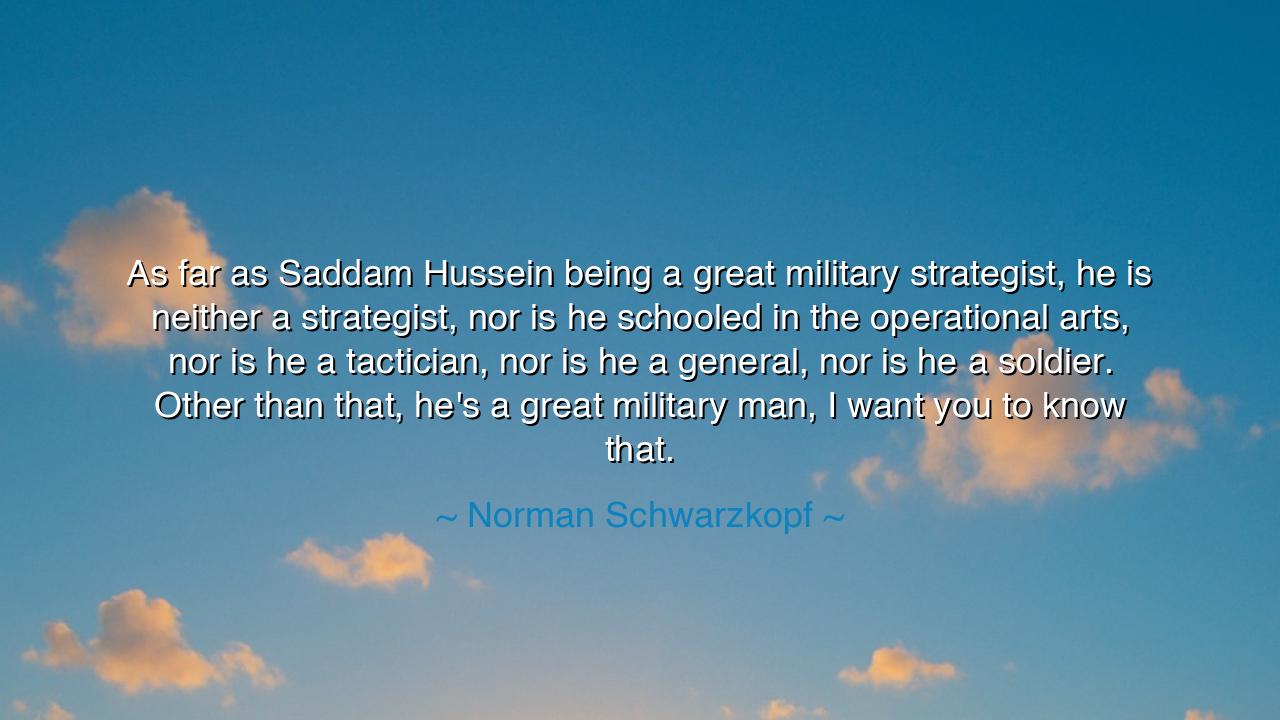
As far as Saddam Hussein being a great military strategist, he is
As far as Saddam Hussein being a great military strategist, he is neither a strategist, nor is he schooled in the operational arts, nor is he a tactician, nor is he a general, nor is he a soldier. Other than that, he's a great military man, I want you to know that.






The words “As far as Saddam Hussein being a great military strategist, he is neither a strategist, nor is he schooled in the operational arts, nor is he a tactician, nor is he a general, nor is he a soldier. Other than that, he’s a great military man, I want you to know that.” were spoken by General Norman Schwarzkopf, the commander of coalition forces during the Gulf War of 1991. Beneath the humor of his tone lies the sharp edge of military truth — a condemnation wrapped in irony, a soldier’s scorn for arrogance untempered by wisdom. His words are not merely mockery; they are a lesson in leadership, a warning against vanity, and a declaration that titles and power mean nothing without the discipline and humility that give them worth.
Schwarzkopf spoke these words in the aftermath of a war that had tested the limits of modern warfare and revealed the flaws of a man who believed himself untouchable. Saddam Hussein, ruler of Iraq, had boasted of his strength, his armies, his missiles, and his divine right to victory. Yet when battle came, his forces were shattered in a matter of days by superior organization, training, and strategy. Schwarzkopf, a man of experience and study, saw in Saddam the danger of pride without knowledge — the ancient folly of the ruler who believes power alone makes him wise. Thus, his biting irony becomes a mirror for all who mistake authority for mastery, ego for greatness, position for virtue.
In the style of the ancients, this is a tale as old as the rise and fall of kings. Xerxes, ruler of Persia, once lashed the sea with chains for daring to defy him, believing nature itself should obey his will — and he, too, was defeated by his own hubris. Napoleon, who crowned himself emperor, met ruin in the snows of Russia because he mistook his ambition for infallibility. And so it was with Saddam, whose armies were vast but whose understanding was small. The general’s words, though spoken with wit, carry the weight of an eternal warning: that the mightiest men fall not to the strength of others, but to the weakness of their own pride.
Schwarzkopf’s ridicule is not born of cruelty, but of discipline. He represents the soldier’s creed — that victory is not a gift of power, but the fruit of knowledge, planning, humility, and respect for the art of war. A true strategist studies the mind of his enemy, the nature of terrain, the limits of his own men. A true soldier knows that courage without wisdom is recklessness, and that command without conscience breeds chaos. By saying Saddam was none of these — not a strategist, not a tactician, not even a soldier — Schwarzkopf stripped away the illusion of grandeur to reveal a tyrant who led his people to ruin while believing himself immortal.
Yet within this mockery lies also a lesson for every man and woman who leads — in war, in work, in life. Pride blinds; humility sharpens. The one who boasts of greatness often builds his downfall with his own words. The wise learn that leadership is not about dominance, but about understanding; not about being feared, but about earning trust. Schwarzkopf’s statement, though aimed at one man, speaks to the universal truth that strength without virtue is hollow, and knowledge without humility leads to destruction.
Consider also the contrast between the two men. Schwarzkopf, though victorious, did not boast; he gave credit to his soldiers, to his allies, and to the discipline of his command. Saddam, though defeated, continued to proclaim himself the hero of his people, blind to the suffering he caused. In this, we see the difference between glory earned and glory imagined. The first is born of sweat, wisdom, and sacrifice; the second is the fragile dream of the arrogant, shattered at the first blow of reality. Thus, the general’s sarcasm becomes a weapon sharper than any blade — truth wrapped in jest, exposing the emptiness of false greatness.
From this, let us draw the lesson of humility and mastery. Do not claim greatness before you have earned it. Do not believe that power or position make you wise. Learn your craft — whether it be war, art, leadership, or life itself — and honor those who came before you. Study deeply, lead wisely, and act justly. For the world remembers not those who boast, but those who build, not those who claim victory, but those who achieve it with honor.
So, let this teaching endure: greatness without discipline is ruin; command without understanding is chaos; and pride without purpose is self-destruction. General Schwarzkopf’s words, though uttered in jest, carry the thunder of truth that echoes through the ages. Be humble in triumph, wise in preparation, and grounded in reality. For as history has shown, the mighty fall not by the strength of their foes, but by the weight of their own arrogance — and the true general is not the one who commands armies, but the one who masters himself.






AAdministratorAdministrator
Welcome, honored guests. Please leave a comment, we will respond soon